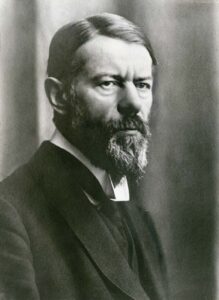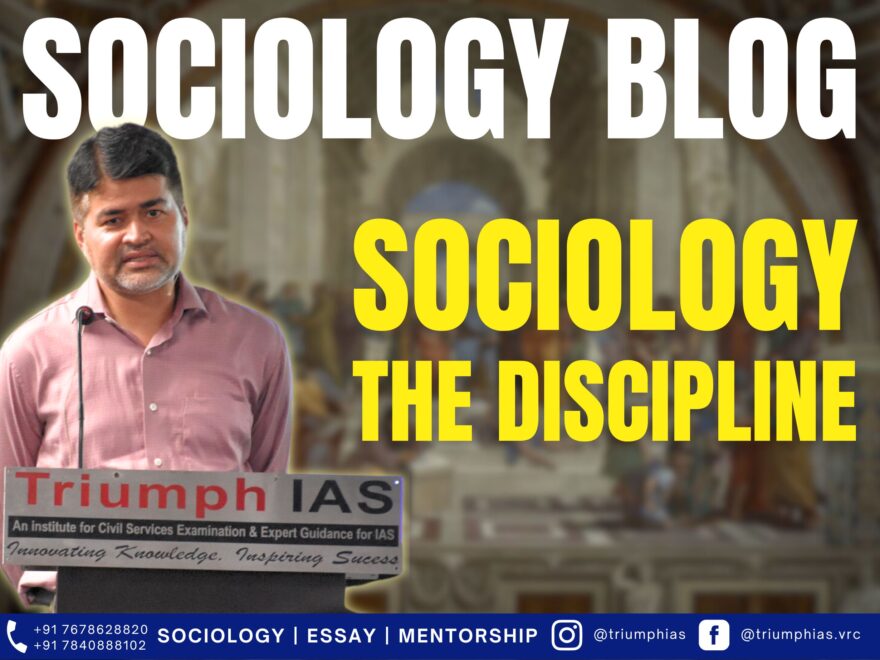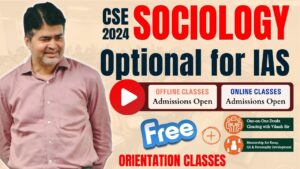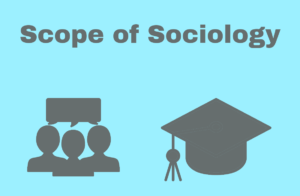
“Politics is a strong and slow boring of hard boards. It takes both passion and perspective. Certainly all historical experience confirms the truth – that man would not have attained the possible unless time and again he had reached out for the impossible.”
-Max Weber
SCOPE OF SOCIOLOGY
(Sociology the Discipline: Relevant for Sociology Paper 1)
Two different schools of thought
There is no consensus among the sociologists regarding the scope of sociology. V.F. Calberton holds, “since sociology is so elastic a science, it is difficult to determine just where its boundaries begin and end, where sociology becomes social psychology and where social psychology becomes sociology or where economic theory becomes sociological doctrine or biological theory becomes sociological theory, something which is impossible to decide.”
There are two main schools of thought among sociologists about the scope of sociology, namely, (1) The Specialistic or Formalistic School and (2) The Synthetic School.
(1) The Specialistic or Formalistic School
This school of thought is headed by German sociologist simmel. the other main figures of this school are Max Weber Small, Vierkandt, Von Wiese and Tonnies. They regard sociology as pure and independent and confine its enquiry into certain defined aspects of human relationships. Sociology should study only the forms’ of social relationships but not their contents. Social relationships such as competition, subordination, division of labour etc. are exemplified in different spheres of social life such as economic, political, religious, moral or artistic etc. Sociology is to disentangle these forms of social relationships and to study them in abstraction. Thus according to Simmel, Sociology is a specific social science which describes, classifies, analyses and delineates the forms of social relationships.
According to Max Weber, Sociology aims at interpreting social behaviour. But social behaviour does not cover the whole field of human relations. Not all human interactions are social. For example; the collusion between two scooterists is merely a common phenomenon but the post-collision effects may constitute social behaviour. Thus sociology is concerned with the analysis and classification of types of social relationships.
Vierkandt maintains that sociology is concerned with the ultimate forms of mental or psychic relationships which links men to another in society. The actual historical societies are a matter of interest for sociologists only as examples of particular types of relationships. He further maintains that in dealing with culture sociology should not concern itself with the actual contents of cultural evolution but it should confine itself only to the discovery of fundamental forces of change and persistence. It should abstain from a historical study of concrete society.
Small Von Wieses and Tonnies together maintain that sociology has a limited scope and it does not undertake the study of all the activities of society.
Criticism of formalistic school
The formalistic school has been criticised on the following grounds:
(1) It has narrowed the scope of sociology: The formalistic school has unnecessarily restricted the field of sociology to a mere study of abstract forms. Sociology should not only study the general forms of social relationships but also their concrete contents.
(2) Sociology alone does not study social relationship: Sociology is not the only science which studies the forms of social relationship. Political science, international Law and Economics also study social relationships.
(3) Conception of pure sociology is impractical: No sociologist has been able to construct a pure sociology. In fact no social science can be studied in isolation from other social sciences. These days high premium is placed on inter-disciplinary approach.
(4) Abstract forms isolated from concrete relations cannot be studied: The distinction between the forms of social relationship and their contents is not feasible. Actually social forms cannot be abstracted from the contents at all, since social forms keep on changing as the contents change. Sorokin mentions, “we may fill a glass with wine, water or sugar without changing its form, but I cannot conceive of a social institution whose form would not change when its members change.”
Thus this school of thought has extremely shrinked the scope of sociology.
(2) Synthetic School
The synthetic school endeavours to make sociology a synthesis of the social sciences or a general science and not a pure discipline. Durkheim, Hobhouse, Sorokin and Moris Ginsberg have been major spokesperson of this school.
(1) Durkheim’s view: According to Durkheim, sociology has three main divisions, namely, (1) Social Morphology, (2) Physiology and (3) General Sociology.
Social Morphology studies the geographical or territorial basis of the life of people and its relation to the types of social organizations and the problems of population such as its volume and density, local distribution etc.
Social Physiology refers to the branches of sociology such as sociology of religion, of morals, of law, of economic life and of language. These branches deal with a set of social facts, that is, the activities related to the different social groups. General sociology discovers the general character of these social facts. It concerns the philosophical part of sociology. It formulates the general laws.
(2) Sorokin’s view: The subject matter of sociology includes the study of relationship between the different aspects of social phenomena; the study of relationship between social and non-social; and the study of general features of social phenomena.
(3) Hobhouse’s view: According to Hobhouse a sociologist should study the social field; secondly he should try to interconnect the results discovered by different social sciences keeping in mind the interconnections of social relations and thirdly, he should interpret the social life as a whole.
(4) Ginsberg’s view: According to Ginsberg sociology studies Social Morphology, Social Control, Social Processes and Social Pathology.
Social Morphology deals with the characteristics of population and studies social structure, social groups and institutions.
Social control refers to the means employed in maintaining social control such as customs, traditions, religion, conventions, law, courts, police etc. It deals with the regulatory authorities and agencies of society. Social Processes studies different modes of interaction such as cooperation, competition, conflict, accommodation, assimilation, isolation, integration, differentiation, development and decay etc. Social pathology studies social problems such as poverty, beggary, unemployment, over-population, crime and prostitution etc.
Thus the scope of sociology is enormous. It is a general science but it is also a special science. The subject matter of all the social sciences is society but their perspectives differentiate them. Only sociology studies social relationship and society itself. Sociology studies all the aspects of society such as social traditions, social processes, social morphology, social control, social pathology and effects of extra social elements on social relationships. Actually it is neither possible nor essential to delimit the scope of sociology because it would be, as Sprott puts it. “A brave attempt to confine an enormous mass of slippery material into a relatively simple system of pigeonholes.”

To master these intricacies and fare well in the Sociology Optional Syllabus, aspiring sociologists might benefit from guidance by the Best Sociology Optional Teacher and participation in the Best Sociology Optional Coaching. These avenues provide comprehensive assistance, ensuring a solid understanding of sociology’s diverse methodologies and techniques.
META TAGS:
scope of sociology answer, scope of sociology as a discipline, scope of sociology assignment, scope of sociology ignou, scope of sociology in different fields, scope of sociology in india, scope of sociology notes, scope of sociology of education, scope of sociology upsc, Best Sociology Optional Teacher, Best Sociology Optional Coaching, Sociology Optional Syllabus.
Follow us :
🔎 https://www.instagram.com/triumphias
🔎https://www.youtube.com/c/TriumphIAS
https://t.me/VikashRanjanSociology
Find More Videos…
#Sociologyforupsc #sociologyforupsc #sociologyforupscgs1 #sociologyforupscprelims #sociologyforupscinenglish #sociologyforupscmainsinhindi #sociologyforupscoptionalinhindi #sociologyforupscmains #sociologyforupscplaylist #sociologyforupsclecture1 #sociologyforupsccse #sociologyforupscoptional #syllabusofsociologyforupscoptional #bestbookforsociologyforupsc #sociologyoptionalforupscanswerwriting #sociologyoptionalforupscanukumari #sociologyoptionalforupscabhijeet #sociologyoptionalforupscanalysis #sociologyoptionalforupscalllectures #sociologysyllabusforupscanalysis





